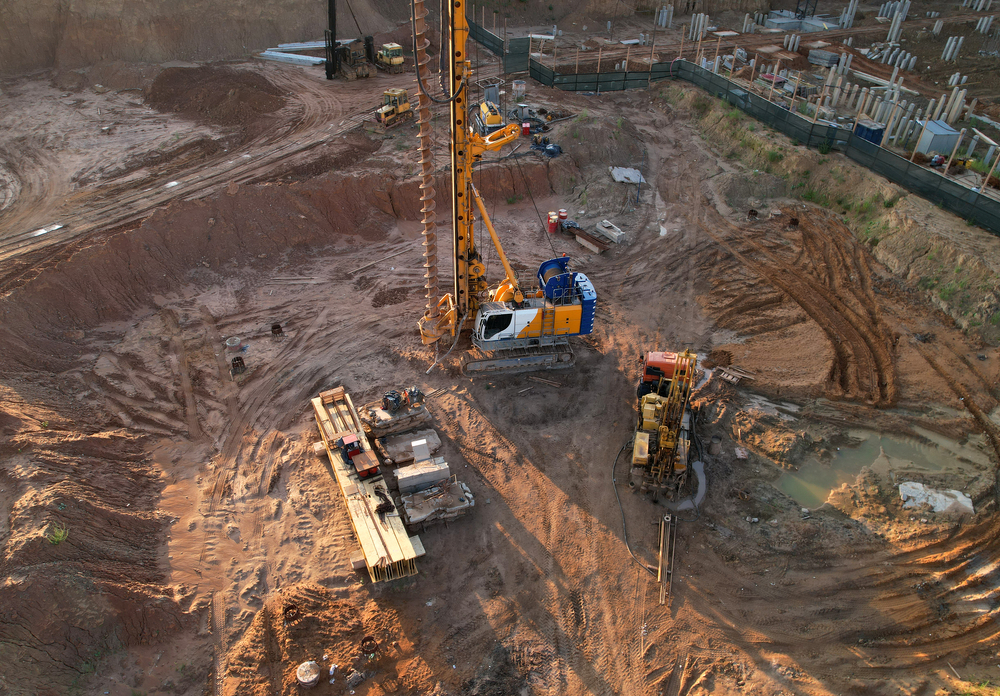How Geotheta can Save You Time, Stress, and Money.
The Main Principles Of Geotheta
Table of ContentsWhat Does Geotheta Mean?Not known Details About Geotheta The 8-Second Trick For GeothetaThe Basic Principles Of Geotheta The 6-Second Trick For Geotheta

They carry out website investigations, collect samples, execute lab tests, and evaluate information to assess the viability of the ground for construction tasks - Tailings Engineer. Based upon their searchings for, geotechnical engineers offer suggestions for structure layout, incline security, retaining structures, and reduction of geotechnical hazards. They work together with other experts, such as engineers, architectural designers, and building teams, to make sure that geotechnical considerations are integrated into the total task layout and implementation
By examining the actions and buildings of dirt and rock, they can determine prospective geotechnical risks such as landslides, soil negotiation, or incline instability. Their proficiency helps prevent failings or accidents that could endanger lives and residential or commercial property. Here are some detailed duties and responsibilities of a geotechnical designer: Website Investigation: Geotechnical designers conduct site investigations to gather information on subsurface problems.
They analyze the data to understand the residential properties and actions of the soil and rock, including their stamina, permeability, compaction attributes, and groundwater conditions. Geotechnical Analysis and Design: Geotechnical designers evaluate the information collected during site investigations to examine the security and viability of the website for building and construction projects. They execute geotechnical calculations and modeling to evaluate variables such as birthing ability, negotiation, incline security, lateral earth pressures, and groundwater circulation.
Geotheta Fundamentals Explained
Foundation Layout: Geotechnical engineers play a critical function in developing structures that can safely sustain the desired framework. They assess the dirt problems and tons demands to determine the appropriate structure type, such as superficial structures (e.g., grounds), deep foundations (e.g (https://www.openstreetmap.org/user/geotheta)., heaps), or specialized strategies like soil improvement. They consider variables such as negotiation limitations, birthing capability, and soil-structure interaction to create optimum foundation layouts
They evaluate building plans, display site activities, and perform field evaluations to validate that the style recommendations are followed. If unpredicted geotechnical problems develop, they evaluate the scenario and provide suggestions for removal or changes to the style. Danger Analysis and Mitigation: Geotechnical engineers assess geotechnical risks and threats connected with the job website, such as landslides, liquefaction, or dirt disintegration.

Collaboration and Communication: Geotechnical designers function closely with other experts involved in a task, such as engineers, architectural designers, and my link building and construction groups. Effective interaction and partnership are necessary to integrate geotechnical considerations right into the total task style and building and construction process. Geotechnical engineers offer technical experience, solution queries, and guarantee that geotechnical requirements are satisfied.
More About Geotheta
Below are some sorts of geotechnical designers: Structure Designer: Foundation engineers specialize in developing and examining structures for frameworks. They analyze the dirt conditions, lots demands, and site characteristics to establish one of the most ideal foundation kind and layout, such as shallow foundations, deep structures, or specialized strategies like stack foundations.
They evaluate the elements influencing slope stability, such as soil homes, groundwater problems, and slope geometry, and develop approaches to avoid incline failures and alleviate risks. Quake Engineer: Earthquake designers specialize in assessing and developing frameworks to stand up to seismic forces. They analyze the seismic hazard of a website, assess soil liquefaction capacity, and create seismic style criteria to make sure the safety and strength of structures throughout quakes.
They perform area testing, gather examples, and examine the gathered information to characterize the dirt homes, geologic formations, and groundwater problems at a site. Geotechnical Instrumentation Designer: Geotechnical instrumentation engineers focus on tracking and measuring the behavior of soil, rock, and structures. They install and maintain instrumentation systems that keep track of elements such as soil negotiation, groundwater levels, slope movements, and structural variations to examine efficiency and offer very early cautions of potential concerns.
Fascination About Geotheta
They conduct tests such as triaxial tests, loan consolidation examinations, straight shear tests, and leaks in the structure examinations to collect information for geotechnical evaluation and layout. Geosynthetics Designer: Geosynthetics engineers focus on the design and application of geosynthetic materials, such as geotextiles, geogrids, and geomembranes. They use these products to enhance dirt security, strengthen slopes, provide water drainage options, and control disintegration.
They tend to be investigatory people, which indicates they're intellectual, reflective, and analytical. They wonder, systematic, logical, logical, and sensible. Some of them are additionally social, meaning they're kind, charitable, cooperative, person, caring, valuable, empathetic, sensible, and pleasant. Does this seem like you? Take our totally free career examination to learn if geotechnical designer is just one of your leading job suits.
In the workplace atmosphere, geotechnical engineers make use of specialized software tools to do calculations, create layouts, and assess information. They prepare records, evaluation task specs, interact with customers and employee, and coordinate task tasks. The office setting supplies a conducive setting for research study, analysis, and cooperation with various other experts involved in the job.
The Main Principles Of Geotheta
They frequently check out project websites to conduct site investigations, assess geotechnical problems, and collect data for evaluation. These check outs include taking a trip to different places, sometimes in remote or difficult surfaces. Geotechnical engineers may perform dirt tasting, conduct examinations, and display building tasks to ensure that the geotechnical elements of the task are being executed properly.
Geotechnical engineers also work in specialized geotechnical laboratories. Geotechnical lab engineers function extensively in these environments, taking care of screening equipment, operating tools, and recording data.